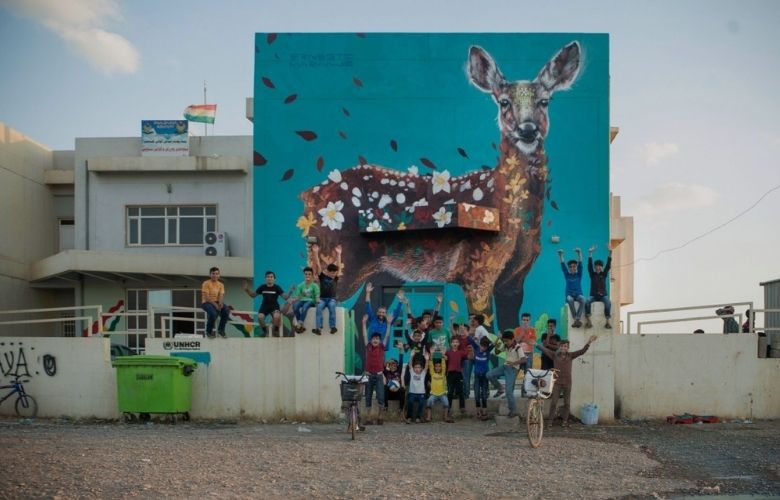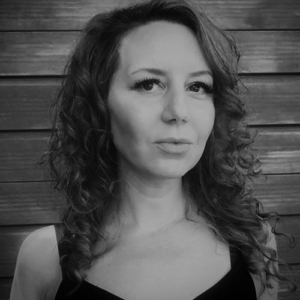
AptART featured at The Entertainment & Performing Arts Industry Conference (EPIC) – a global online entertainment conference held across 24 hours on 10th January 2022. Spanning four categories of Perform, Create, Design, and Produce, the event has been host to a broad spectrum of entertainment professionals sharing their stories and wisdom across all industries and areas of the Arts. With events running concurrently across the 24-hour period creating a treasure trove of content (that’s available to dive into on demand in the coming month), we reflect on some of the highlights from the event.
Samantha and Safen are artists and activists who have risked their lives to bring art to people. They work with various organisations around the world including AptART, Art+, and Make Life Skate Life.
We work with youth and their communities across the globe to create collaborative public art. Since 2010 we have been sharing creative outlets and amplifying the voices of marginalized groups. With the aim of transforming spaces, connecting communities and sparking conversations, we have spent the last decade painting walls, implementing workshops and installing exhibitions in Iraq, Jordan, Syria, Turkey, Palestine, Tunisia, Myanmar, Mozambique, Kenya, The Democratic Republic of Congo, Belgium, France, Greece, Tunisia, Germany, The United Kingdom and The United States.
Samantha and Safen met in Kurdistan in Iraq (Safen’s homeland) in 2011 during the protest times. Kurdistan is a politically charged area, yet is full of beauty and culture. The duo met at a time when there was a lot happening in the area working towards a better future. Both believe that the protests did reshape the politics of the middle east and what we have today including the fall of Gaddafi and the rise and fall of ISIS, and the time known as the ‘Arab Spring’ enabled Samantha and Safen’s work to rise up.
They started their art organisations with the ethos of believing in public space for people, citing that most often public space makes you think of advertising – utilising a Banksy quote that encourages the reader to take back the space that has been enforced on us to consume. It resonates with the idea of public space and what it is utilised for, mainly to sell or get you to behave in a certain way and manipulate you, and make you feel like all the fun is happening somewhere else.
With this philosophy as the driving force, Samantha and Safen use murals to reclaim public space, and bring happiness and joy to the people who see them and bring inclusivity and positivity. Sometimes they will paint wheelbarrows, cars, and tents, because sometimes there are no walls and they need to spread the message far and wide.
While looking at the extent of the work that’s been created and the number of countries that the organisations have been to in the last ten years, it’s quite overwhelming appreciating that in this current conversation, the topic is only on refugees, displaced peoples, and those affected by conflict. It’s heart-breaking and heart-warming in equal measure.
To create a new piece, they hold workshops with children, their parents and the community to discuss the issue and the message they would like to send – for the community to the community. This is always incredibly diverse, as in the case of working in Mozambique on HIV and breaking down stigma, whereas the Democratic Republic of the Congo led to working with former soldiers and street kids and then in war-torn Syria. As the Syrian conflict worsened, the duo ended up working all over the region with children who had been displaced by war in refugee camps and ‘hopeless places’. Painting a Doctors Without Borders children’s hospital in Jordan with Syrian refugees had a focus on building community and inclusivity. On the Gaza strip, the aim was to work in an area that had been attacked and bombed.
Samantha and Safen explained that the Kurdish area of Iraq has a lot of refugees from various countries and they have the same language and traditions, so it doesn’t feel like a camp it feels like home – they can work, do activities, school, it is an open place that welcomes people. In Jordan there is not much freedom for the refugees, however in the Kurdish area of Iraq it is much more free and can be a beautiful place for the people – they do not want to go back to Syria or Iran or Turkey.
In 2014 they made more than 15 murals around the camps, some had difficulties because of different groups that were fighting in one camp, however the artists persevered. There were worries about putting words on the walls because of the mixed groups different writing styles, combined with high levels of illiteracy, so they came up with the idea of a picture that represented everyone, and wanted to empower everyone. The groups were consulted and asked, and a lot of them wanted to talk about their religion and so the concept of a mosaic skyline was created that depicted all of the religions – the array of many colours make it a beautiful metaphor for co-existing in harmony, with peaceful mountains in the background. It was created with one child painting one brick each on the building.
Samantha and Safen also told us about various projects they had undertaken with children painting an array of themes on murals as well as on canvas, citing a project whereby UNHCR allowed them to recycle refugee tents for the artwork as canvases which were then turned into a mural. The canvases were sewn to create the quilt of resilience, sending the message that it’s our shared humanity that will allow us to overcome the difficulties that we have.
Recently, they have been working with host communities in Lebanon – they had taken a lot of refugees while suffering their own issues and conflict, with almost a 1/5 ratio of refugees in the population of this small country.
Deeply rooted in skate culture, Make Life Skate Life seeks to nurture grassroots skate communities. Since 2013, we have constructed 10 skateparks that have positively impacted the lives of thousands in communities that can’t access these opportunities.
Our Impact
In many parts of the world, young people grow up in difficult circumstances and economic hardship without access to recreation, play and a safe space where they can seek refuge.
The construction of the skateparks has led to the creation of grass-roots projects that use skateboarding to empower underserved youth from difficult backgrounds whose lives have been marked by displacement, conflict, poverty and marginalization.
After construction of skateparks, we help with the implementation of skate programs that aim to include females, disadvantaged and refugee youth, and use skateboarding as a tool for teaching cross-cultural communication, creative self expression and resilience to underserved youth populations.
The goal is that our local partners take full ownership and independently run the projects in the long-term while acquiring enough skills to lead their next projects.
Samantha and Safen tell us about the skate parks they have created, in one example in Baghdad the area went from having 10 skateboarders to over 1,000 now. While this is a success, and the fully concrete, high standard build was a success, getting there was not an easy process. There was a new referendum with political turmoil and elections happening at the time of the park build, and so there was a risk bringing the 45 international volunteers to create the park – people thought they were crazy. It took 20 days to finish the project.
Safen is proud to tell us that at the beginning, there were just 5% of skater girls, and now the girls make up a much more even 45%, which is a great improvement and a sign of progress. He continues to share that they are really happy kids, it’s very safe, they have good relationships, and the families are so happy that the kids are going skating and getting outside, interacting with others and exercise away from screens! In fact it was so popular they had to come back the next year and extend the skate park.
Working as an artist and activist is a cause close to Safen’s heart, as he grew up during the civil war and didn’t have access to art or activities as a child. Skateboarding allows children to have a childhood. The skate parks are safe spaces for everyone – Lebanese kids, Syrian, Palestinian refugees, everybody. Samantha always had a passion for wanting to help people have their voices heard, and followed her artistic and humanitarian calling to get where she is today.
Check out the incredible work that Samantha and Safen are doing on the AptART website, and get in touch with them with any suggestions, ideas and projects on Instagram at @aptarts.
Accessibility At The Smith Center Series: Part One
James “Fitz” FitzSimmons Interview: The Boys In The Band On Netflix


Michelle is a musician and composer from the UK. She has performed across the UK and Europe and is passionate about arts education and opportunities for women and girls.
Read Full Profile© 2021 TheatreArtLife. All rights reserved.

Thank you so much for reading, but you have now reached your free article limit for this month.
Our contributors are currently writing more articles for you to enjoy.
To keep reading, all you have to do is become a subscriber and then you can read unlimited articles anytime.
Your investment will help us continue to ignite connections across the globe in live entertainment and build this community for industry professionals.